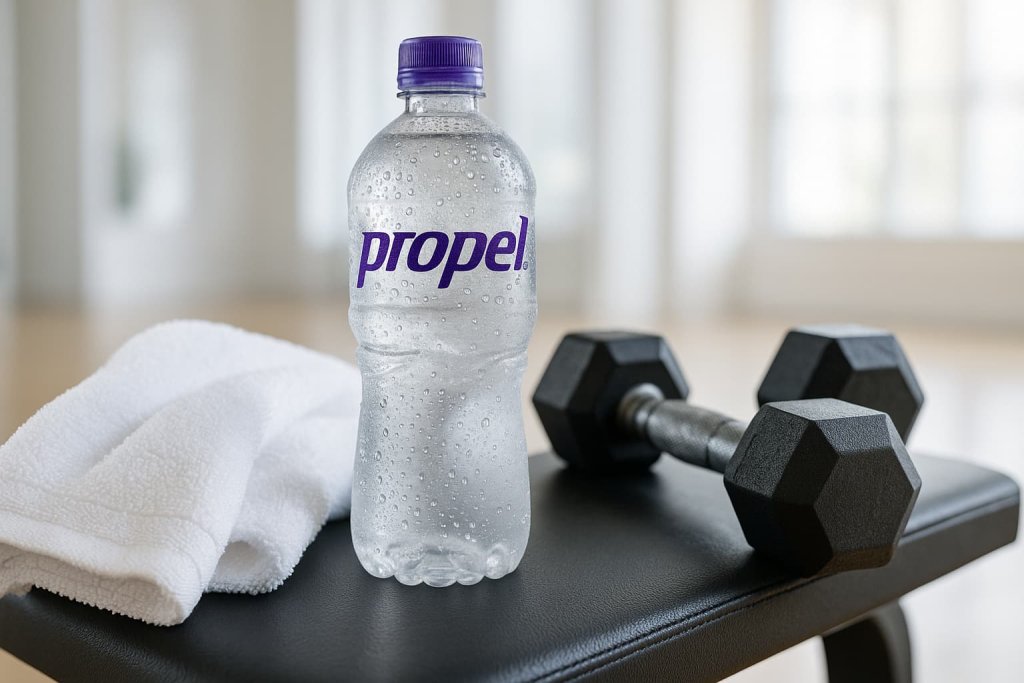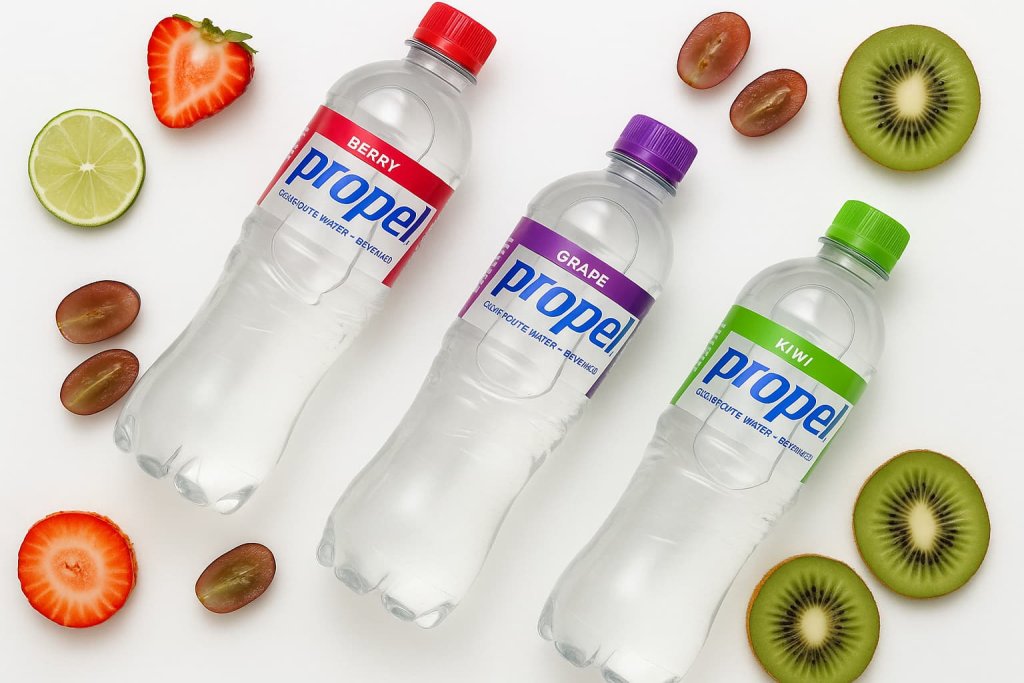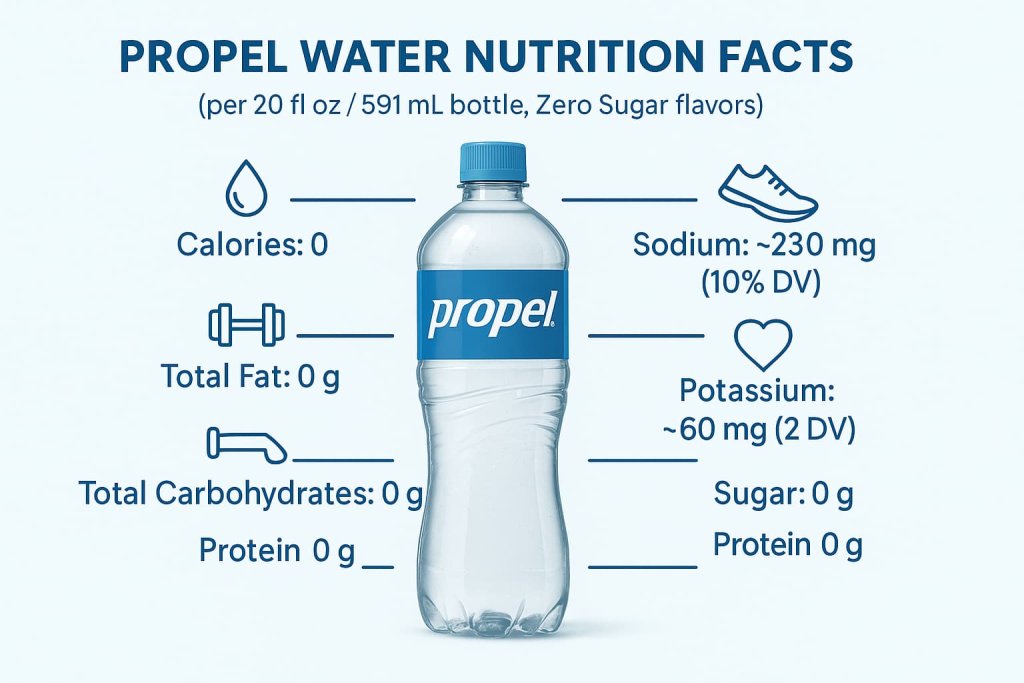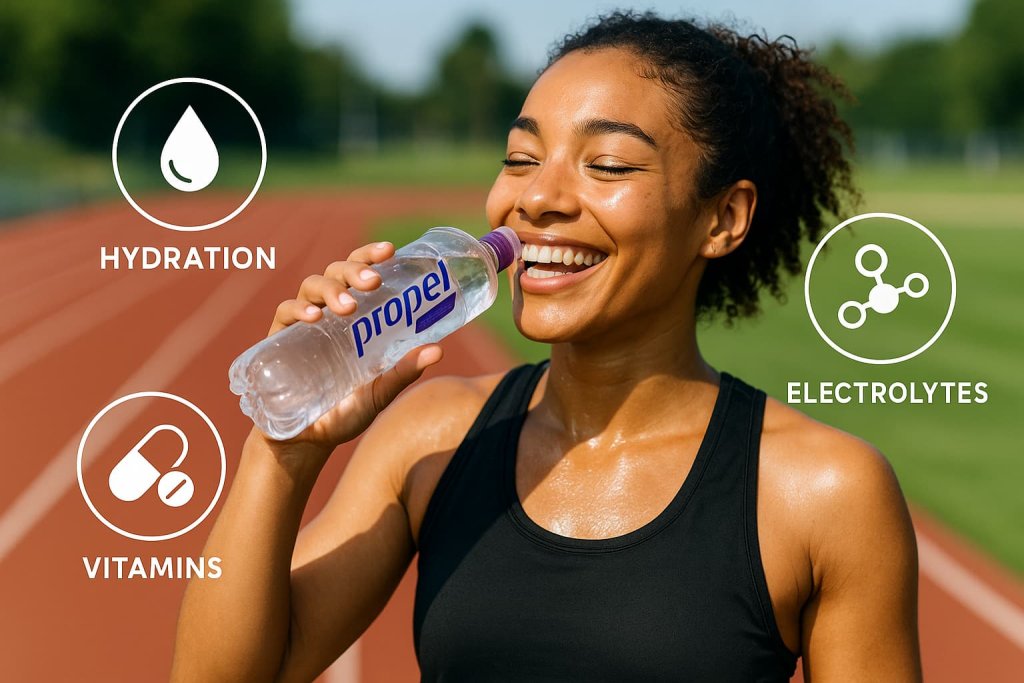Yes, Propel water can be good for you when used for hydration during exercise or hot conditions because it replaces electrolytes without adding sugar or calories. However, it contains artificial sweeteners and preservatives, so plain water should remain your primary daily drink. Knowing when Propel helps — and when it’s unnecessary — will keep your hydration strategy on point.

In this guide, you’ll learn what Propel water is, its nutrition facts, benefits and risks, who should drink it, and how it compares with plain water and sugary sports drinks.
What Is Propel Water?

Propel is a flavored “fitness water” developed by Gatorade (PepsiCo). It’s designed to help replace electrolytes lost through sweat while providing flavor and small amounts of vitamins. Unlike traditional sports drinks, Propel contains zero sugar and zero calories and is sweetened with sucralose and acesulfame potassium.
Learn more: Propel Water – Wikipedia
Propel Water Nutrition Facts (per 20 fl oz / 591 mL bottle, Zero Sugar flavors)

- Calories: 0
- Total Fat: 0 g
- Sodium: ~230 mg (10% DV)
- Potassium: ~60 mg (2% DV)
- Total Carbohydrates: 0 g
- Sugar: 0 g
- Protein: 0 g
Added Vitamins & Minerals:
- Vitamin C: ~25 mg (30% DV)
- Vitamin E: ~2.5 mg (15% DV)
- Niacin (Vitamin B3): ~10 mg (60% DV)
- Vitamin B6: ~1 mg (50% DV)
- Pantothenic Acid (Vitamin B5): ~5 mg (50% DV)
- Phosphorus (some flavors, e.g., Grape): ~148 mg (10% DV)
✅ Key Takeaways:
- Propel is calorie-free and sugar-free, unlike traditional sports drinks.
- It provides electrolytes (sodium & potassium) plus added B vitamins, C, and E.
- Sodium is the main electrolyte — helpful during exercise but something to monitor if you’re watching salt intake.
Benefits of Propel Water

1) Hydration With Electrolytes
Propel helps replace sodium and potassium lost through sweat, which supports fluid balance during workouts, sports, or hot weather.
Reference: Center for Science in the Public Interest – Electrolyte Waters
2) Zero Sugar & Zero Calories
Because it’s sugar-free and calorie-free, Propel won’t spike blood sugar and can fit weight-management goals. It’s also a sensible swap if you’re cutting back on soda or sweetened sports drinks.
Further reading: Hone Health – Is Propel Water Good for You?
3) Small Vitamin Boost
Added vitamin C, vitamin E, and B vitamins offer a minor nutrient bump, though they shouldn’t replace a balanced diet.
4) A Better “In-Place-Of” Choice
If your alternative is soda, juice, or a high-sugar sports drink, Propel is generally a healthier pick.
Downsides of Propel Water
1) Artificial Sweeteners
Propel uses sucralose and acesulfame potassium. These are FDA-approved, but some individuals report digestive discomfort or prefer to avoid artificial sweeteners. Research continues on long-term effects and taste preference conditioning.
Overview: Hone Health – Artificial Sweeteners Considerations
2) Preservatives & Acids
Ingredients like citric acid, potassium sorbate, and sodium hexametaphosphate keep flavor stable but mean Propel isn’t just “plain water.”
3) Sodium Considerations
At 160 mg sodium per bottle, frequent intake may not be ideal for those with high blood pressure or kidney issues. Check your total dietary sodium.
4) Not Necessary for Everyday Hydration
For routine, low-sweat days, plain water is usually sufficient and should be your go-to.
Does Propel Water Hydrate Better Than Water?
Propel water can help with hydration during exercise or hot weather because it contains electrolytes like sodium and potassium, which replace what you lose through sweat. In these conditions, Propel may feel more effective than plain water.
However, for everyday hydration when you aren’t sweating heavily, plain water hydrates just as well — and sometimes better — without additives or sweeteners. Electrolyte waters like Propel are not necessary unless you’re exercising intensely or spending long hours in heat.
Bottom line: Propel does not hydrate “better” than water for daily needs. It’s most useful when you need electrolyte replenishment, but plain water is still the best everyday choice.
When Should You Drink Propel Water?
Propel water isn’t necessary for every situation, but it can be useful in specific cases:
- During or after exercise: When you sweat, your body loses electrolytes like sodium and potassium. Propel helps replace them without adding sugar.
- In hot weather: If you’re outdoors in high heat or humidity, Propel can help prevent dehydration and electrolyte imbalance.
- After illness or dehydration: During recovery from mild dehydration, Propel may support rehydration better than plain water.
- As a soda alternative: If you’re trying to cut back on sugary beverages, Propel provides flavor without calories.
You don’t need Propel if you’re just sitting at your desk, watching TV, or doing light daily activities. For most people, plain water is enough for everyday hydration.
Tip: Think of Propel as a hydration “tool” for active moments — not a full-time replacement for water.
Who Should Avoid Propel Water?
While Propel water is safe for most people, some groups may want to limit or avoid it:
- People with high blood pressure: Propel contains sodium (160 mg per 20 oz bottle). Regular intake may add up and affect blood pressure.
- Individuals with kidney problems: Extra electrolytes (sodium, potassium, phosphorus) may put unnecessary stress on kidneys.
- Those sensitive to artificial sweeteners: Propel uses sucralose and acesulfame potassium, which can cause digestive discomfort in some people and may not be suitable if you prefer to avoid artificial ingredients.
- Children as a daily drink: Propel is safe in moderation, but plain water is a better everyday option for kids.
- People relying only on flavored drinks: Over time, artificial sweeteners may keep your taste buds accustomed to sweetness, making plain water less appealing.
👉 If you fall into any of these categories, stick mainly to plain water and use Propel only occasionally when electrolyte replacement is truly needed.
Propel vs. Plain Water vs. Gatorade
| Drink | Calories | Sugar | Electrolytes | Best Use Case |
|---|---|---|---|---|
| Propel Water | 0 | 0 g | Yes | Light to moderate exercise; sugar-free flavor |
| Plain Water | 0 | 0 g | No | Everyday hydration |
| Gatorade | ~120 | ~30 g | Yes | Intense/long-duration exercise requiring carbs + electrolytes |
Is Propel Water Safe for Long-Term Use?
Propel water is generally safe for most healthy adults when consumed in moderation. The electrolytes and vitamins are not harmful at typical intake levels, and the product is FDA-approved.
That said, there are a few points to consider for long-term, daily use:
- Artificial sweeteners: Propel uses sucralose and acesulfame potassium. Current research shows they are safe, but some studies suggest possible effects on gut bacteria or appetite regulation.
- Sodium intake: At 160 mg per 20 oz bottle, Propel isn’t “high sodium,” but daily multiple servings could add up, especially if you already eat a high-salt diet.
- Additives and preservatives: Ingredients like citric acid and potassium sorbate are considered safe, but they aren’t necessary for everyday hydration.
- Dental health: Acidic ingredients (like citric acid) may, over time, contribute to tooth enamel erosion if consumed frequently.
Bottom line: Propel is safe for occasional or workout-related use. For long-term daily hydration, plain water is still the healthiest and most natural choice. Use Propel strategically — not as your only water source.
Who Should Drink Propel Water?
- Good for: People exercising or sweating heavily; those in hot climates; anyone replacing soda or sugary sports drinks.
- Use caution if: You have high blood pressure or kidney conditions; you’re sensitive to artificial sweeteners; or you struggle to drink plain water without flavor.
Expert Verdict
So, is Propel water good for you?
- ✔ Yes, if you need a sugar-free electrolyte boost during exercise or want a healthier alternative to soda.
- ❌ No, if you drink it constantly instead of water or if you are sensitive to additives and sodium.
Plain water should remain your everyday hydration choice, but Propel is a smart alternative in the right situations.
FAQs About Propel Water
1. Is Propel better than Gatorade?
Yes, Propel is better if you want zero sugar and zero calories. Gatorade is more useful for endurance athletes who need quick carbs.
2. Can I drink Propel every day?
Yes, but balance it with plain water to limit sweeteners and sodium.
3. Is Propel safe for people with diabetes?
Yes, it has no sugar and won’t raise blood glucose levels.
4. Does Propel count toward daily water intake?
Yes, Propel contributes to hydration just like water.
5. Is Propel good for weight loss?
Yes, if it replaces high-calorie drinks.
6. Does Propel contain caffeine?
No, regular Propel water does not contain caffeine.
7. Can kids drink Propel?
Yes, occasionally, but plain water should be the main drink for children.
Conclusion
Propel water is a good hydration option in certain scenarios: workouts, hot weather, or when you want a flavored alternative without sugar. It’s healthier than soda or sugary sports drinks, but it shouldn’t replace plain water as your primary hydration source.
👉 The best approach: use Propel strategically for exercise and recovery, but stick to plain water for everyday hydration.
References
- Propel Water – Wikipedia
- Center for Science in the Public Interest – What to Know About Electrolyte Waters
- Hone Health – Is Propel Water Good for You?
- EatingWell – Electrolyte Drink Taste Test
Note: Always consider your personal health conditions and consult a healthcare professional about sodium and sweetener intake if you have specific concerns.
